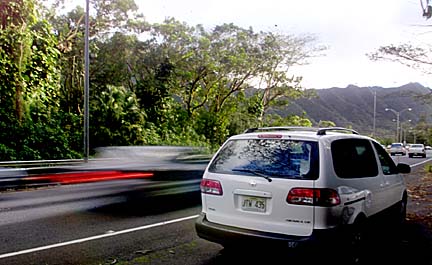


![]()
Talk Story

|
I HAD TO LAUGH when I heard Brian Minaai, state director of transportation, now wants the counties to assume the blighted "Tali-van" program. Naturally, county mayors and police chiefs are fending off this tar baby with long sticks, hoping none of it rubs off. Camera-vans are a fiasco,
politically and financiallyHonolulu Mayor Jeremy Harris distanced himself early on. "People are now driving too slow," Harris spokesperson Carol Costa told The New York Times back in January. "They're driving in packs so their plates can't be seen by the cameras. There are people who speed around the packs of cars. And the vans, of course, themselves are being targeted by drivers."
The Big Island can't afford to install camera equipment in its county vehicles and doesn't have the staff to man them. Besides, said Janet Snyder, spokeswoman for Mayor Harry Kim, the state general fund gets the fines, so where would the county pay for the program?
Maui mayor, Kimo Apana, says the vans are better suited to multi-lane Oahu highways. On Maui's two-lane blacktop it's easy for police to pull speeders over. Who needs cameras?
Minaai says the state should adopt a model code that the National Association of Governors drew up, which assumes camera-van-generated speeding tickets can be handled the same as parking tickets. Unfortunately, letting a meter expire doesn't affect your auto insurance rate. Speeding convictions do.
This is just one of the dissonances that have plagued the program. Another was the assumption that auto license plates adequately identify lawbreakers.
The program's primary mission, according to the DOT is to save lives. So far, it hasn't been able to measure its success on those terms.
"There is very strong evidence that the photo enforcement program is working," Minaai said early this month. "The number of major crashes dropped 14.7 percent from January 2001 to January 2002, and the number of minor crashes dropped 10.2 percent," he said.
However, HPD reported 10 traffic fatalities on Oahu roadways in January 2002 compared with four in January 2001. Fatalities actually increased after the vans hit the streets. How come?
HPD traffic investigators told the Star-Bulletin last November that they see no correlation between traffic enforcement and fatalities. They attributed 24 of the fatalities on Oahu to inattention, 23 to speed, five to alcohol or drug use and 14 to a combination of speed and alcohol or drug use.
Investigators told the newspaper, "All counties have seen the number of fatalities go up and down without any apparent trend in the last 10 years."
Successful or not, the certain doom of the current camera-van program is spelled out on its balance sheet. By the end of February, two months into a three-year test period, it was already $80,000 in the red.
The state's contract with Affiliated Computer Services was written under the incorrect assumption that the speeding tickets would, indeed, be treated like parking tickets. It guaranteed ACS $29.75 for each "Tali-van" ticket paid.
In December, the courts stepped in and said that they would also require driver's license numbers to record speeding violations on the violator's driving record. Without a license number, a ticket couldn't be issued.
Matching up the names of licensed drivers and registered vehicle owners turned out to be harder than you might assume. In fact, more often than not, it couldn't be done. After two months in operation, ACS had written 4,500 tickets that were not issued because the names couldn't be matched.
ONLY 1,236 numbers were successfully matched and tickets issued. That's 22 percent, less than one in four. As a result, the state has received about $57,000 in fines to pay for the program, while it owes ACS more than $137,000.
Speeding fines are $27, plus an additional $5 for every mile per hour the vehicle exceeds the posted speed limit. The $27 base fine jumps to $52 if the violator waits until the court date to pay.
Since the contract didn't include the requirement to match the numbers, the DOT agreed in January to pay ACS $22.31 for each ticket that can't be issued because the names don't match.
It's a great deal for ACS, but it raises questions about due process and equal treatment. If the name on your driver's license happens to match the one on your registration and you are nabbed for speeding by a "Tali-van," you'll pay a fine and your driving record and insurance premiums will reflect the violation.
However, if you speed in a company car, for example, or one registered in somebody else's name, you're off the hook.
Lucky you live Hawaii.
John Flanagan is the Star-Bulletin's contributing editor.
He can be reached at: jflanagan@starbulletin.com.